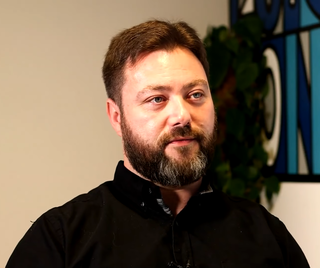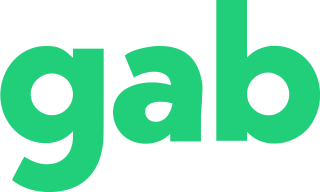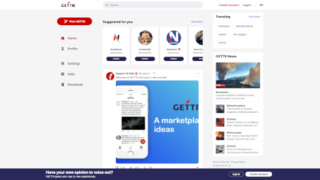
YouTube is an American global online video sharing and social media platform headquartered in San Bruno, California, United States. It was launched on February 14, 2005, by Steve Chen, Chad Hurley, and Jawed Karim. It is owned by Google and is the second most visited website, after Google Search. YouTube has more than 2.5 billion monthly users, who collectively watch more than one billion hours of videos each day. As of May 2019, videos were being uploaded at a rate of more than 500 hours of content per minute.
Google and its subsidiary companies, such as YouTube, have removed or omitted information from its services in order to comply with company policies, legal demands, and government censorship laws.

Parler is an inactive American alt-tech social networking service associated with conservatives. Launched in August 2018, Parler marketed itself as a free speech-focused and unbiased alternative to mainstream social networks such as Twitter and Facebook. Journalists have described Parler as an alt-tech alternative to Twitter, with its users including those banned from mainstream social networks or who oppose their moderation policies.

David Joshua Rubin is an American conservative political commentator. He is the creator and host of The Rubin Report, a political talk show on YouTube and on the network BlazeTV. Launched in 2013, his show was originally part of TYT Network, until he left in 2015, in part due to widening ideological differences. Previously, Rubin hosted LGBT-themed talk shows, including The Ben and Dave Show from 2007 to 2008 and The Six Pack from 2009 to 2012, both of which he co-hosted with Ben Harvey. Rubin has written two books.

Tumblr is a microblogging and social networking website founded by David Karp in 2007 and currently owned by American company Automattic. The service allows users to post multimedia and other content to a short-form blog. Users can follow other users' blogs. Bloggers can also make their blogs private. For bloggers, many of the website's features are accessed from a "dashboard" interface. As of March 2023, Tumblr hosts more than 572 million blogs.

Jordan Bernt Peterson is a Canadian psychologist, author, and media commentator. He began to receive widespread attention in the late 2010s for his views on cultural and political issues, often described as conservative. Peterson has described himself as a classic British liberal and a traditionalist.
Shadow banning, also called stealth banning, hellbanning, ghost banning, and comment ghosting, is the practice of blocking or partially blocking a user or the user's content from some areas of an online community in such a way that the ban is not readily apparent to the user, regardless of whether the action is taken by an individual or an algorithm. For example, shadow-banned comments posted to a blog or media website will not be visible to other users accessing the site.

Patreon is a membership platform that provides business tools for content creators to run a subscription service. It helps creators and artists earn a monthly income by providing rewards and perks to their subscribers. Patreon charges a commission of 9 to 12 percent of creators' monthly income, in addition to payment processing fees.

Carl Benjamin, also known by his online pseudonym Sargon of Akkad, is a British far-right anti-feminist YouTuber and political commentator. A former member of the Eurosceptic right-wing UK Independence Party (UKIP), he was one of its unsuccessful candidates for the South West England constituency in the 2019 European Parliament election.

Gab is an American alt-tech microblogging and social networking service known for its far-right userbase. Widely described as a haven for neo-Nazis, racists, white supremacists, white nationalists, antisemites, the alt-right, supporters of Donald Trump, conservatives, right-libertarians, and believers in conspiracy theories such as QAnon, Gab has attracted users and groups who have been banned from other social media platforms and users seeking alternatives to mainstream social media platforms. Founded in 2016 and launched publicly in May 2017, Gab claims to promote free speech, individual liberty, the "free flow of information online", and Christian values. Researchers and journalists have characterized these assertions as an obfuscation of its extremist ecosystem. Antisemitism is prominent in the site's content and the company itself has engaged in antisemitic commentary. Gab CEO Andrew Torba has promoted the white genocide conspiracy theory. Gab is based in Pennsylvania.
BitChute is an alt-tech video hosting service launched by Ray Vahey in January 2017. It describes itself as offering freedom of speech, while the service is known for hosting far-right individuals, conspiracy theorists, and hate speech. Some creators who use BitChute have been banned from YouTube; some others crosspost content to both platforms or post more extreme content only to BitChute. Before its deprecation, BitChute claimed to use peer-to-peer WebTorrent technology for video distribution, though this was disputed.

Deplatforming, also known as no-platforming, has been defined as an "attempt to boycott a group or individual through removing the platforms used to share information or ideas", or "the action or practice of preventing someone holding views regarded as unacceptable or offensive from contributing to a forum or debate, especially by blocking them on a particular website."

OnlyFans is an internet content subscription service based in London, United Kingdom. The service is used primarily by sex workers who produce pornography, but it also hosts the work of other content creators, such as physical fitness experts and musicians.
MeWe is a global social media and social networking service. As a company based in Los Angeles, California it is also known as Sgrouples, Inc., doing business as MeWe. The site has been described as a Facebook alternative due to its focus on data privacy.
Locals Technology Inc., or locals.com, is a creator crowdfunding site cofounded by Dave Rubin and Assaf Lev. It started in 2019 and is based in New York City.
Substack is an American online platform that provides publishing, payment, analytics, and design infrastructure to support subscription newsletters. It allows writers to send digital newsletters directly to subscribers. Founded in 2017, Substack is headquartered in San Francisco.
Alt-tech are social media platforms and Internet service providers that have become popular among the alt-right, far-right, and others who espouse extreme or fringe opinions, in the belief that these alternatives moderate content less stringently than mainstream internet service providers.
Censorship by TikTok affects material published by people on the Chinese social media platform TikTok. There is evidence that TikTok has down-weighted the posts of topics deemed sensitive by the Chinese government and Chinese Communist Party, LGBTQ+ people, disabled people, and certain African-American hashtags. TikTok's explanations for this vary, ranging from attempting to protect users from bullying to algorithmic mistakes.

Gettr is an alt-tech social media platform and microblogging site targeting American conservatives. It was founded by Jason Miller, a former Donald Trump aide, and was officially launched on July 4, 2021. Its user interface and feature set have been described as very similar to those of Twitter.
Pillowfort is an American social media networking service and microblogging website. The website was launched in 2017 and is currently in open beta. As of October 2020, the site had more than 100,000 users.











